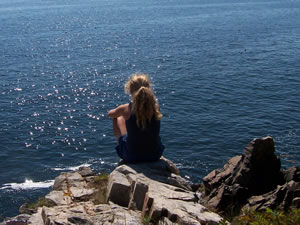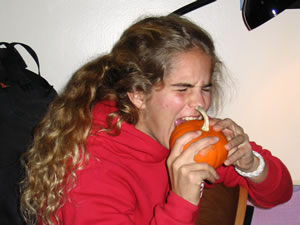Kate Jackson
At the age of 18, I had never had any sort of educational experience outside of Massachusetts. I grew up in a fairly wealthy and homogeneous rural town and I went to a small regional public school. My classmates and I had been told that we went to one of the best schools in the state. It turns out that this was a bit of a myth.

My education there was limited, especially in science. There was definitely a dominant idea that girls could not succeed in math and science. I was told by my parents and teachers that I should be a writer for the rest of my life, because “that’s what you’re good at”. I was not encouraged to push myself in other areas. Part of this was also provoked by my own insecurity; I believed the underlying paradigm of those around me, and I figured that the boys in my class had natural ability in those subjects and I did not. Getting to college broke this illusion apart, and although my focus at Bates is social and political anthropology I have also had the opportunity to be pre-med. Every science and math professor I have had here has encouraged me (I had only one math teacher in high school who was supportive in that way). In my first two years at Bates I took a lot of chemistry, organic chemistry and biology and I have learned an incredible amount.
I was often bored with my education as I was growing up. I filled my time with being an overachiever in school and with running cross-country to fill time, until I got injured. I never looked too hard for something else to do - there just weren’t many options, and I was too stuck in a rut to do anything new. I was very addicted to the work aspect of school – I wanted to win the academic game, but I didn’t really care about learning.

By the end of my senior year, I was so exhausted and burnt out that I never wanted to go to school again. I didn’t have anything else in mind, but I knew I didn’t want to go to college. I was a bit of a machine though, so I still applied to a few random colleges and I ended up going to Bates with painfully low expectations. I just didn’t think there was much out there for me.
Three years later, I can honestly say that I have been transformed by my college education. A large part of this has been the friends I have met here and the community work I have done in a city that is very different from my hometown. My friends at Bates come from all over the world, and my work in Lewiston is predominately with refugee families from Somalia and the Sudan. It’s important to consider college not only for the academic life, but because of the relationships you could have never made within the structure you grew up in.
It was crucial for me to get into a new educational environment. It’s scary to think what my life would have been like if I had followed through with my desire not to go on to higher education; I would have remained trapped in all kinds of constructs and dangerous illusions that would have kept me lazy, pessimistic and poisoned with a very specific view of the world.
